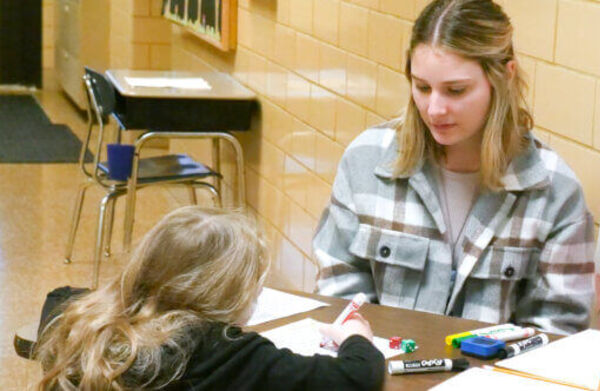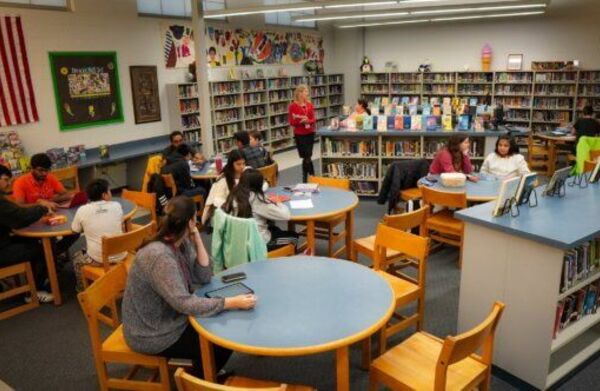Posted on
How a tutoring organization in California builds partnerships and empowers future educators using FWS
Categories: Policy and Advocacy, Pathways into Teaching

Source: Step Up Tutoring
In the summer of 2020, Tess Marme’s husband directed her attention to a TV segment about Step Up Tutoring, a nonprofit organization that was pairing elementary and middle school students in high-need communities with high-impact math tutors, at no cost to families, to help address pandemic-related disruptions to learning.
“I thought, oh my goodness, I have to reach out,” recalls Marme, who serves as the Associate Director for the Student Employment Office at Pepperdine University. In her role, Marme helps manage the university’s Federal Work-Study (FWS) program, which connects students who have financial need to part-time jobs that can pay for college and university expenses. While FWS jobs range widely from roles like campus bookstore cashier to office receptionist, Marme saw a partnership with Step Up as an opportunity to provide more FWS roles that would allow students to take on roles that serve the local community, a growing commitment of the university.
The partnership blossomed, and dozens of Pepperdine FWS students have since served as Step Up tutors. Sean Oh, a Pepperdine junior, shares that tutoring with Step Up has not only helped pay for “everything I need right now” but also provided a rewarding experience to build deep and trusting relationships with his tutees, help them navigate challenges to grow academically, and cultivate their confidence and appetite for learning:
Oh’s tutoring – and that of many other Step Up tutors – is contributing to collective impact for student learning acceleration: elementary and middle school students who experienced the recommended dosage of Step Up’s program had four times the rate of growth in math compared to those who didn’t, according to an early assessment pilot.
A critical funding source to scale high-impact tutoring
High-impact tutoring has demonstrated consistently through research to be one of the most effective intervention tools for student learning recovery and acceleration; however, across the country, a significant majority of PK-12 students aren’t accessing it. One of the biggest reasons is the cost.
Released last March, DFI’s policy report Mobilizing Aspiring Teachers as Tutors identified significant federal and state funding opportunities that can be amended to not only scale high-impact tutoring but also strengthen local educator pipelines. Funding sources like FWS, we pointed out, can be incredibly valuable for mobilizing college students who may already be planning to pursue careers in education-related roles, like teaching.
For example, while Step Up recruits community members, educators, parents, and other adults as tutors, its partnership with colleges and universities, including educator-preparation programs, to source college students has been especially meaningful.

“The college students are very mission-driven,” shares Sam Olivieri, CEO of Step Up Tutoring. “Almost all of them come to us because education meant something to them. Many of them have stories around somebody who helped them in their pathway. And so they see this as a way to give back and to expand opportunities to the next generation.”
We amplified FWS as one vital funding solution through news media and championed its value with federal leaders, including the U.S. Department of Education and members of Congress, and partnering national organizations like Accelerate, the Pathways Alliance, and the National Partnership for Student Success. Soon afterward, U.S. Secretary of Education Miguel Cardona called on universities to use more FWS funds to “increase the number of college students supporting school-aged children and youth as tutors, mentors, student success coaches, and other student support roles.” The U.S. Department of Education asked that higher education institutions use a minimum of 15 percent of their FWS funds – more than double its previous guidance of at least seven percent – for community service, including tutoring, to contribute to student learning recovery efforts.
Navigating the complexities of securing FWS partnerships
While meaningful progress has since been made to steward FWS as a critical funding opportunity, many tutoring programs have expressed that it isn't easy to secure higher education partners. Despite the high need for tutors, and the benefits of a partnership, programs have found the process complex. Each institution has its own deadlines, requirements, and reporting stipulations, Olivieri explains, so it takes significant research, planning, and outreach.
However, she encourages programs to persist. Once the first few partnerships are established, Olivieri shares, it becomes easier to source additional partners, secure more sustainable funding, and expand recruitment efforts.
Today, Step Up has partnered with 16 colleges and universities to use FWS – a rare and significant endeavor from which other tutoring programs across the country can learn.
“We were very fortunate in the formation of Step Up Tutoring to work with Pepperdine,” says Lisa Elson, Step Up’s Director of Community Outreach. “We realized what a great resource work-study could be. So we looked up all the FWS directors to reach out to, requested informational interviews, and persisted in pursuing those partnerships. We’ve been fortunate to build 16 partnerships that have proven to be a lifeblood of great tutors for our organization.”
Olivieri shares additional insights on how the organization grew its quantity of FWS partnerships over time:
The persistence and outreach have proven fruitful; this 2023-24 academic year, Step Up received more than 550 applications from interested students through their FWS partnerships.
A promising gateway to the teaching profession
The potential for tutoring to be a gateway for more college students to confidently pursue a career in education is something that Marme has observed among students who choose to join Step Up: “It's developed their passion for teaching. It definitely opened them up to think, ‘Hey, this is something I can do and I love doing this.’”
Bryce Savoy, a Step Up tutor and junior at the University of Southern California, shares that because having FWS doesn’t guarantee a job, he spent a long time applying for roles, not all of which were relevant to his immediate professional interest of working with children. He was elated to eventually find a role related to his career aspirations and affirms how the experience can help aspiring teachers get an early feel for the profession:
The additional focus Step Up has on helping strengthen the educator workforce is something that school and district partners have paid special attention to. Ann Argo, Coordinator for Tutoring Services at Los Angeles Unified School District, sees the value of having a tutoring partner that is not only thinking about direct impact on student learning but also planting the seeds for addressing local teacher shortages and inspiring more individuals to become educators:
“This isn't just a tutoring program for our upper elementary students,” Argo says. “This is a program for college-level students who are receiving the investment…These are people that will hopefully continue to pay it back as future educators, whether as tutors or teachers or leaders, and hopefully in their own community as well.”
Step Up Tutoring is a program in DFI’s Aspiring Teachers as Tutors Network. Learn more at stepuptutoring.org.
Additional resources:
For colleges and educator-preparation programs: Sign up to join the U.S. DOE’s call-to-action and receive guidance, support, and more on using FWS for student support roles through the National Partnership for Student Success (NPSS), a White House initiative. DFI is proud to be a Supporting Champion of NPSS.
For policymakers: Read DFI’s policy report, Mobilizing Aspiring Teachers as Tutors, to learn about and take action on policy solutions – including funding opportunities – that can both accelerate student learning and strengthen local teacher pipelines. Policy leaders can also view specific state-level and federal-level action plans from the report. Additionally, FutureEd has published Learning Curve: Lessons from the Tutoring Revolution in Public Education, which includes three different ways to scale high-impact tutoring from an analysis of three communities.
- For tutoring programs: Access the Toolkit for Tutoring Programs from the National Student Support Accelerator, which includes useful information for implementing and strengthening high-impact tutoring efforts. You can also review their funding guidance for more information about post-ESSER funding. Saga Education has also published resources in Leveraging the Federal Work-Study Program for P-12 Tutoring.
Related Stories:

Blog
Proving the possible: how an Ohio partnership is bringing tutoring to scale
Like many schools across the US impacted by the pandemic, Crim Elementary School in northwest Ohio..
May 24, 2023

Blog
Delivering on the Promise of High-Impact Tutoring
Last summer, President Biden called upon our country to deliver 250,000 tutors...
March 30, 2023

Blog
From tutor to teacher: how Illinois’s state tutoring program is building local pathways into teaching
In a brightly-lit corner of the library at Rochelle Middle School, aspiring math teacher Angie...
March 09, 2023







